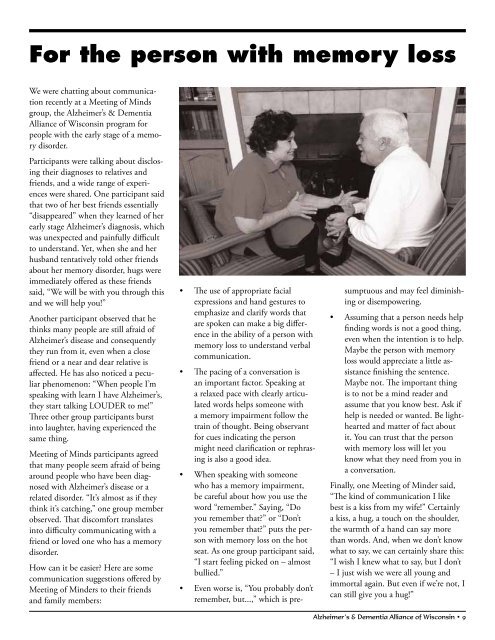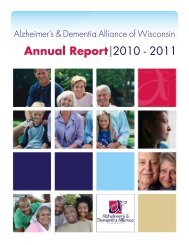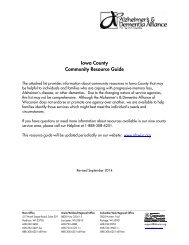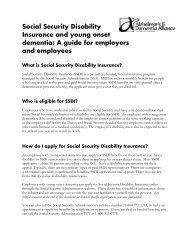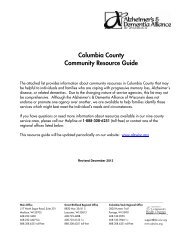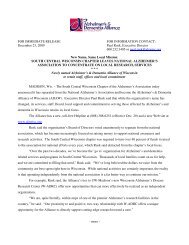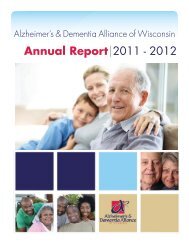Inside - Alzheimer's & Dementia Alliance of Wisconsin
Inside - Alzheimer's & Dementia Alliance of Wisconsin
Inside - Alzheimer's & Dementia Alliance of Wisconsin
Create successful ePaper yourself
Turn your PDF publications into a flip-book with our unique Google optimized e-Paper software.
For the person with memory loss<br />
We were chatting about communication<br />
recently at a Meeting <strong>of</strong> Minds<br />
group, the Alzheimer’s & <strong>Dementia</strong><br />
<strong>Alliance</strong> <strong>of</strong> <strong>Wisconsin</strong> program for<br />
people with the early stage <strong>of</strong> a memory<br />
disorder.<br />
Participants were talking about disclosing<br />
their diagnoses to relatives and<br />
friends, and a wide range <strong>of</strong> experiences<br />
were shared. One participant said<br />
that two <strong>of</strong> her best friends essentially<br />
“disappeared” when they learned <strong>of</strong> her<br />
early stage Alzheimer’s diagnosis, which<br />
was unexpected and painfully difficult<br />
to understand. Yet, when she and her<br />
husband tentatively told other friends<br />
about her memory disorder, hugs were<br />
immediately <strong>of</strong>fered as these friends<br />
said, “We will be with you through this<br />
and we will help you!”<br />
Another participant observed that he<br />
thinks many people are still afraid <strong>of</strong><br />
Alzheimer’s disease and consequently<br />
they run from it, even when a close<br />
friend or a near and dear relative is<br />
affected. He has also noticed a peculiar<br />
phenomenon: “When people I’m<br />
speaking with learn I have Alzheimer’s,<br />
they start talking LOUDER to me!”<br />
Three other group participants burst<br />
into laughter, having experienced the<br />
same thing.<br />
Meeting <strong>of</strong> Minds participants agreed<br />
that many people seem afraid <strong>of</strong> being<br />
around people who have been diagnosed<br />
with Alzheimer’s disease or a<br />
related disorder. “It’s almost as if they<br />
think it’s catching,” one group member<br />
observed. That discomfort translates<br />
into difficulty communicating with a<br />
friend or loved one who has a memory<br />
disorder.<br />
How can it be easier? Here are some<br />
communication suggestions <strong>of</strong>fered by<br />
Meeting <strong>of</strong> Minders to their friends<br />
and family members:<br />
• The use <strong>of</strong> appropriate facial<br />
expressions and hand gestures to<br />
emphasize and clarify words that<br />
are spoken can make a big difference<br />
in the ability <strong>of</strong> a person with<br />
memory loss to understand verbal<br />
communication.<br />
• The pacing <strong>of</strong> a conversation is<br />
an important factor. Speaking at<br />
a relaxed pace with clearly articulated<br />
words helps someone with<br />
a memory impairment follow the<br />
train <strong>of</strong> thought. Being observant<br />
for cues indicating the person<br />
might need clarification or rephrasing<br />
is also a good idea.<br />
• When speaking with someone<br />
who has a memory impairment,<br />
be careful about how you use the<br />
word “remember.” Saying, “Do<br />
you remember that?” or “Don’t<br />
you remember that?” puts the person<br />
with memory loss on the hot<br />
seat. As one group participant said,<br />
“I start feeling picked on – almost<br />
bullied.”<br />
• Even worse is, “You probably don’t<br />
remember, but...,” which is pre-<br />
sumptuous and may feel diminishing<br />
or disempowering.<br />
• Assuming that a person needs help<br />
finding words is not a good thing,<br />
even when the intention is to help.<br />
Maybe the person with memory<br />
loss would appreciate a little assistance<br />
finishing the sentence.<br />
Maybe not. The important thing<br />
is to not be a mind reader and<br />
assume that you know best. Ask if<br />
help is needed or wanted. Be lighthearted<br />
and matter <strong>of</strong> fact about<br />
it. You can trust that the person<br />
with memory loss will let you<br />
know what they need from you in<br />
a conversation.<br />
Finally, one Meeting <strong>of</strong> Minder said,<br />
“The kind <strong>of</strong> communication I like<br />
best is a kiss from my wife!” Certainly<br />
a kiss, a hug, a touch on the shoulder,<br />
the warmth <strong>of</strong> a hand can say more<br />
than words. And, when we don’t know<br />
what to say, we can certainly share this:<br />
“I wish I knew what to say, but I don’t<br />
– I just wish we were all young and<br />
immortal again. But even if we’re not, I<br />
can still give you a hug!”<br />
Alzheimer’s & <strong>Dementia</strong> <strong>Alliance</strong> <strong>of</strong> <strong>Wisconsin</strong> • 9


